|
|
| |
Chianciano Terme and surroundings: between art, nature, food and wine |
|
|
|
|
|
| |
| |
|
|
|
|
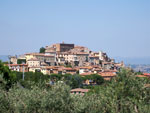 |
|
Chianciano Terme, not only
Chianciano Terme is closely and naturally connected to the prestigious spas,
but are not to be overlooked, however, the architectural and artistic landmarks
including the urban core, the suggestive Medieval Church of Saint John the
Baptist, the Church of Santa Maria della Rosa, built in the 16th century, and
the |
|
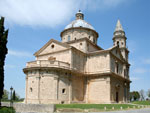 |
|
Montepulciano , 10 km
The town has been called the Pearl of the 16th century, since it preserves
intact its beauty with palaces and churches of the greatest architects of the
Renaissance. To see the beautiful Piazza Grande, with the Cathedral from incomplete façade and the Palazzo Comunale. In the valley below the village a
must-see landscape |
| remarkable Palazzo del Potestà origins even adiacent; much appreciated by
tourists and visitors, finally, it appears the charming Museo civico
archeologico delle Acque. |
and absolutely unforgettable, stands the mole elegant Temple
of S. Biagio. And how can we not mention the "Vino Nobile", one of the
most appreciated Tuscan wines at international level. |
| |
|
|
|
|
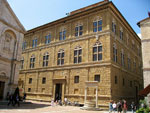 |
|
Pienza, 20 km
Pienza, "born to love a thought and a dream of beauty", as Giovanni Pascoli.
Much of his most beautiful architecture was carried out by Pope Pius II,
transforming the Christmas village camping in a beautiful Renaissance town, outstanding example of
fifteenth-century architecture and urbanism. |
|
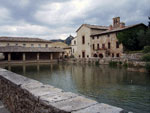 |
|
Val d'Orcia
Crossed by the River Orcia, which gives it its name, is characterized by
pleasant landscaped vistas and several centers of medieval origin, the Valley
is also an important natural, cultural and artistic, and from 2 July 2004 has
been recognised as a UNESCO World Heritage site. In addition to Pienza and Montalcino |
| In three years, between 1459 and
1462, the new birth Cathedral Pienza saw dell'assunta, Palazzo Piccolomini,
Palazzo Comunale and the Episcopal Palace with its Museum. |
|
part of Parc, Castiglione d'Orcia, Radicofani and San Quirico
d'Orcia. Other important centers are: Monticchiello, Bagno Vignoni, Rocca
d'Orcia, Campiglia d'Orcia, Bagni San Filippo, Vivo d'Orcia. |
| |
|
|
|
|
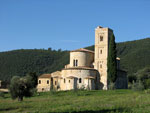 |
|
Montalcino, 40 km
Made famous by Brunello, one of the best red wines in the world, Montalcino is
also a magnificent city of art, rich palaces and churches and at the top of
which stands the beautiful medieval fortress that dominates the famous
vineyards. Montalcino still keeps unaltered its charm of the ancient medieval
village. |
|
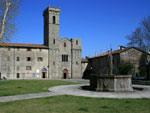 |
|
Abbadia S. Salvatore
and Monte Amiata, 30 km
Mount Amiata is a relief of 1738 m s.l.m. Tuscan Apennines, between the Maremma, Val d'Orcia and Val di Chiana, not far from Umbria and Lazio.
It is the most important ski resort in southern Tuscany.
Its height and its location make it possible |
| In the town of Montalcino, is a beautiful monastery, the Abbey of Sant'Antimo,
founded on an ex-voto attributed to Charlemagne around 781, one of the
masterpieces of Romanesque architecture in Italy. |
|
to ski all winter.From Monte Amiata is possible to observe and see for hundreds kilometers the larger landscape in central Italy. |
| |
|
|
|
|
|
|
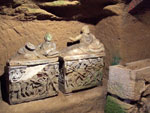 |
|
Chiusi, 13 km
Archaeological site of great importance, as evidenced by the exhibits at the
Museo Archeologico Nazionale Etrusco. Deserve careful visit, Etruscan tombs,
the Museum of the Cathedral, which contains a valuable collection of codexes
Benedictines, the Cathedral of San Secondiano, 6th century, which is the |
|
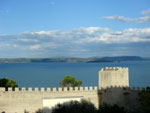 |
|
Trasimeno Lake, 30 km
Lake Trasimeno, with its three islands: major, minor and Polvese, immersed in
the green of its reed beds, with a side of ancient villages, castles and
cathedrals on the Umbrian hills, part of Tuscany, and partly covered with olive
groves and vineyards, is the fourth Lake of Italy and the largest of the Umbrian regional parks |
| oldest
church of the catacombs of Santa Mustiola and Santa Caterina and King
Porsenna's Labyrinth-a path that winds through the underground tunnels of
Etruscan-thatthrough the subsoil of Chiusi, leads to a monumental cistern. |
|
that has always been an important area for aquatic birds
and a perfect habitat for fish species. Don't miss visiting the medieval towns
of Città della Pieve, Panicale, Castiglione del Lago, Passignano sul Trasimeno
and Tuoro sul Trasimeno. |
| |
|
|
|
|
|
|
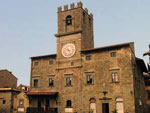 |
|
Cortona, 40 km
The main tourist and cultural centre of the Val di Chiana aretina after the
provincial capital, Cortona was one of the twelve cities of the Etruscan
League. Fragments of its primitive cyclopean defences can still be seen, the
medieval walls.Apart from a few fine Renaissance palaces, medieval buildings is
prevalent and helps |
|
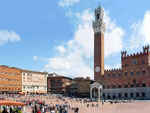 |
|
Siena, 80 km
The city is widely known for its artistic heritage and for the substantial
stylistic unity of its medieval urban furniture, as well as for his famous
Palio; the town was declared a UNESCO World Heritage site in 1995.
The medieval
period, the most significant buildings as the Palazzo Comunale, the walls, which has always |
| give narrow and steep streets look very impressive. Given
the elevated position from every point of embracing the whole of the
Valdichiana. |
|
protected, Piazza del Campo, the Cathedral, expanded in later
times. Increase the value of Siena are also evocative landscapes along the
way. |
| |
|
|
|
|
|
|
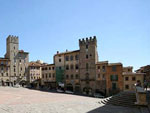 |
|
Arezzo, 70 km
Arezzo is a beautiful city that deserves a visit for its numerous historic-
artistic beauties and its characteristic historic centre. Although part of the
medieval town was destroyed during World War II, the Centre preserves splendid monuments, churches, palaces and museums. The Basilica of San Francesco, |
|
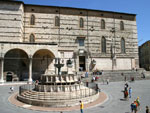 |
|
Perugia, 75 km
Art cities rich in history and monuments, is a cultural and economic hub of
the region and attracts tourists and students. Perugia is located on a hill
that rises on the Tiberina Valley not far from Lake Trasimeno and the Monte
Subasio. The major palaces and monuments of artistic interest are close to Corso Vannucci. |
| perhaps
the most famous Church of the city, with the cycle of frescoes of the legend of
the true cross by Piero della Francesca's masterpiece of the Renaissance. And
then the Fortezza Medicea, the Roman amphitheatre and the Church of San
Domenico with crucifix by Cimabue. |
|
Some side doors along the course are access to terraces from
where you can enjoy a beautiful landscape and where you can find markets and
restaurants. Strolling through the local villages is easy to meet, themed pub
and restaurants where you can sample the specialties of the area. |
|
|
| |
|
|
|
|
|
| |
Distances from Chianciano Terme |
|
|
|
|
| |
Montepulciano=10 km
Monticchiello=15 km
Pienza=20 km
Bagno Vignoni e la Val d'Orcia=20 km
San Quirico d'Orcia=25 km
Castiglione d'Orcia=25 km
Montalcino=40 km
Chiusi=13 km
San Casciano dei Bagni=25 km
Abbadia S. Salvatore=30 km
Trequanda=30 km
Monte Oliveto Maggiore=40 km
Cortona=40 km
Città della Pieve=25 km
Lago Trasimeno=30 km
Arezzo=70 km
Siena=80 km
Orvieto=60 km
Perugia=75 km
Assisi=90 km
Todi=80 km
Cascata delle Marmore=130 km
Spoleto=140 km
Firenze=120 km
Roma=180 km
|
|
| |
 |
|
| |
The Terre di Siena DOP Oil |
|
|
| |
 |
|
The cultivation of olive trees in the territory of Siena goes back a long time
ago.
The olive tree is present in the works of art and paintings late |
|
Middle Ages, a period in which, even writers testify the presence of this
plant between the Sienese hills.
Go to the discovery of this precious oil will
be a real gastronomic itinerary that combines tradition and artistic beauties
to pleasant tasting of extra virgin olive oil. |
| |
 |
|
| |
Strada del Vino Nobile di Montepulciano |
|
|
| |
 |
|
Montepulciano and its wine is synonymous with quality and excellence of the
wine. In addition to wine tour in wine producing companies |
|
| |
Noble, the Strada del Vino Nobile promotes visits to sights of the city of
Montepulciano and surroundings and wine tasting cellars monumental town, visits
to workshops, wine tastings and typical products in wineries, cheese factories
and Mills, restaurants, wine and oil tasting, cooking classes, spa treatments,
biking and walking tour of movie sets. |
|
| |
 |
|
| |
Strada del Vino Orcia |
|
|
| |
 |
|
La Strada del Vino Orcia, includes the territories of the comuni of Abbadia
San Salvatore, Chianciano Terme, Montalcino, Pienza, Castiglione |
|
| |
d'Orcia, Radicofani, San Casciano dei Bagni, San Giovanni d'asso, San Quirico
d'Orcia, Sarteano, Torrita di Siena and Trequanda.
To know and appreciate not
only wine, but also all other products of the best advice is to go directly to
individual producers and all towns of the Val d'Orcia. |
|
| |
|
|
|
|